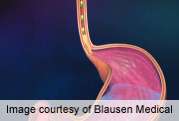A six-food elimination diet can successfully treat adults with eosinophilic esophagitis, according to a study published in the June issue of Gastroenterology.
(HealthDay) -- A six-food elimination diet can successfully treat adults with eosinophilic esophagitis (EoE), according to a study published in the June issue of Gastroenterology.
Nirmala Gonsalves, M.D., of the Northwestern University Feinberg School of Medicine in Chicago, and colleagues conducted a study involving 50 adults with EoE who were treated with a six-food elimination diet (SFED) for six weeks. The foods eliminated were: milk, soy, egg, wheat, peanuts/tree nuts, and shellfish/fish. Participants underwent esophagogastroduodenoscopy (EGD), biopsies, and skin-prick tests before treatment. Histologic response was defined as having ≤5 eosinophils per high-power field (eos/hpf), and responders underwent systematic reintroduction of food, after which, EGD and biopsies were repeated.
The researchers found that 96, 74, and 94 percent of participants experienced dysphagia, food impaction, and heartburn, respectively. In the proximal and distal esophagus, there was a significant reduction in the peak eosinophil count after SFED (from 34 to 8 and from 44 to 13 eos/hpf, respectively). Sixty-four percent of participants met the criteria for a histologic response and 70 percent had peak counts ≤10 eos/hpf after SFED; symptom scores improved for 94 percent of participants. Problem foods identified on reintroduction were wheat (60 percent of cases) and milk (50 percent of cases). Only 13 percent of foods associated with EoE were identified on skin-prick testing.
"An elimination diet significantly improves symptoms and reduces endoscopic and histopathologic features of EoE in adults," the authors write. "Food reintroduction re-initiated features of EoE in patients, indicating a role for food allergens in its pathogenesis."
More information:
Abstract
Full Text (subscription or payment may be required)
Journal information: Gastroenterology
Copyright © 2012 HealthDay. All rights reserved.


















